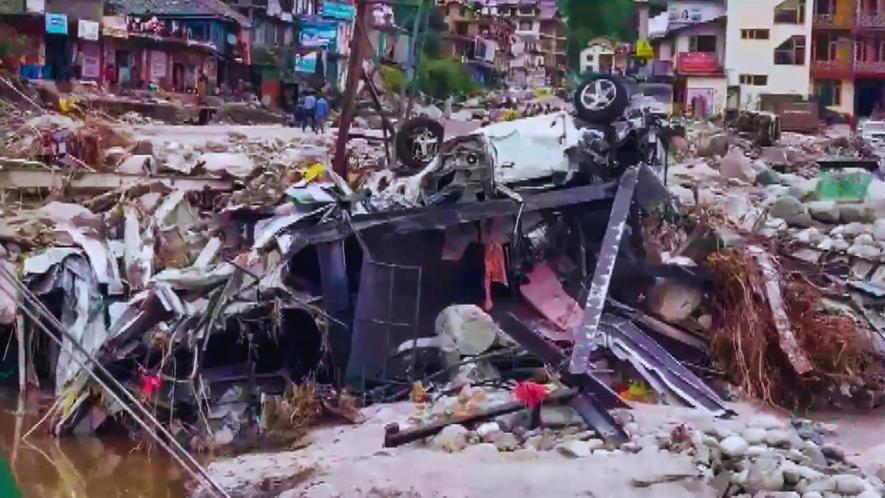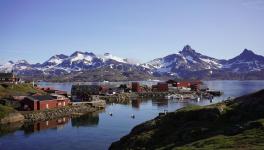Human Greed at Epicentre of (Un)natural Devastation in Himachal

Kullu: A damaged vehicle amid debris following recent flash floods triggered by cloud burst in Kullu district, Thursday, July 13, 2023. (PTI Photo)
Himachal Pradesh has been the epicentre of (un)natural disasters for more than a month. More than 300 people, including 35 on Monday, have been killed, thousands left homeless and property worth more than Rs 1,500 crore destroyed.
Himachal is situated in the Himalayas, which has been affected by climate change. The rising temperature and changing rainfall patterns increase the frequency and intensity of extreme weather events, such as landslides, flash floods and cloudbursts.
The small hilly state has limited resources of income but the human, natural, and economic loss caused by the disaster has been huge.
Human greed and the government’s neoliberal policy is the leading cause of the disaster.
According to researcher Dianne Dredge, “During the shift from the European Dark Ages to the scientific revolution, there was a move away from blind faith in the Church, temple, mosques and feudal relationships towards trust in science, democracy, capitalism and the role of government as protector of public interests.”
According to him, one of the most significant developments during this time was rational scientific thinking which, for the last three centuries, led to four very substantial effects:
Individualism: The rise of the individual worldview
where the focus is on self-interest, competition and individual wealth-creation over collective public interests has flourished. Individualism assumes that people act out of self-interest and personal gain.
Reductionism: The practice of analysing, describing and diagnosing complex, dynamic challenges in terms of a single explanation to provide a best-fit solution. Reductionism
assumes complex problems can be dealt with by reducing the problem into small manageable discreet parts, such as marketing, management and economic growth.
Separation: Individuals were distanced from each
other and nature. This separation effectively distanced individuals from taking personal responsibility for their actions, relying instead on science and law to divest, outsource and off set personal responsibility. For example,
responsibility can be externalised and passed off through laws, regulations and voluntary sustainability criteria so that it is someone else’s problem. This is how sustainability becomes everyone’s challenge but not one’s responsibility.
Marketisation: Individualism and separation allowed competition, consumerism and individual wealth accumulation to flourish. The collective public interest and
caring for common resources gave way to the pursuit of
private interests where, presumably, the invisible hand was thought to take care of negative impacts.
Influenced by these four dimensions over the last century, the
scientific mindset has evolved to embrace blind faith in strategic management and neoliberal economic ideologies as the primary forces shaping our economic–social–environmental relations. This belief system has shaped our relationship with nature, each other, ourselves, and what we perceive as success.
In this view, nature is broken down into individual resources (e.g. water, air, minerals, forests, beaches, communities, workers, etc.), and the key task has been to extract maximum value from these resources to fuel economic production and consumption. “In other words, these resources are there for the taking. Governments have largely acted as facilitators in opening these resources for exploitation, not their protectors.”
As a result, corporate entities are blindly following neoliberal
policies to exploit nature and taking nature only as a resource to fulfil their wishes and aspirations. They fail to understand that the human being is a smaller system than the whole, which is nature, letting governments provide full opportunities to corporate entities and capitalists to exploit nature for their benefit.
Due to the greed of the corporate sector, carbon emission hasn’t been reduced to the minimum level by many powerful countries. Opportunities for the extraction of natural resources and heavy unsustainable practices in the name of industrial development and tourism development are provided to them by governments.
These policies have resulted in global warming and climate change, which are the main causes of this destruction.
On the other hand, the government is also giving licences for reckless mining, hydropower projects, unsustainable road building and stone crushing in the mountains, which has triggered landslides.
To overcome the challenge of such disasters, we must change our mindset for development and learn from nature by collaborating with local communities. A multidisciplinary, holistic approach to development consisting of empathy and care for nature and local communities is needed.
A dynamic and co-evolutionary process of development consisting of the confluence of scientific, progressive and indigenous knowledge systems and perspectives of local communities for the long-term socio-cultural, economic and ecological development of the planet is the need of the hour.
Society should stimulate, if not pressure, the government to provide education, health and employment in every village. A cooperative sustainable industrial and marketing system should be developed with ample opportunities for a regenerative agricultural and tourism system to provide jobs and promote a particular place’s cultural and natural heritage.
This is the only way to strike a proper balance with nature and prevent (un)natural and man-made calamities.
The writer is a research scholar at the Central University of Kerala
Get the latest reports & analysis with people's perspective on Protests, movements & deep analytical videos, discussions of the current affairs in your Telegram app. Subscribe to NewsClick's Telegram channel & get Real-Time updates on stories, as they get published on our website.
























